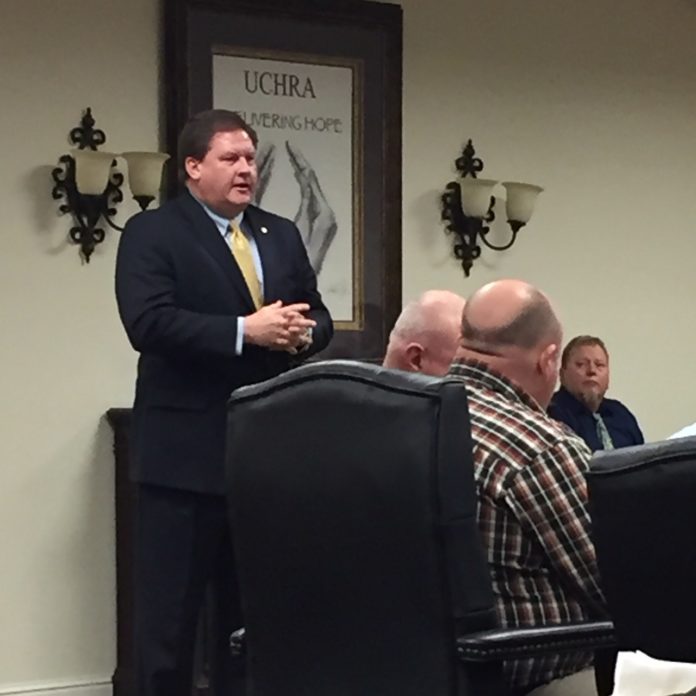By Amye Anderson
UCBJ Managing Editor
COOKEVILLE – How many consumer representatives serving on the various boards and committees serving UCHRA actually utilize services provided by the agency? And, how are they appointed to their respective boards and committees?
That discussion came about during Tuesday’s continuation of last week’s regular board meeting, which ended in a recess, as members asked for clarification regarding the reappointment of a now-vacant position on the agency’s grievance committee. Don Woodlee, who served as the vice chairman and consumer representative of that committee, recently resigned from his post.
“What you normally do is, the county mayor and the city mayor of that county would get together and pick a representative that’s going to be a consumer of those services and then, once you do that, you give it to your county coordinator and they had to be voted upon by their peers,” said James Starnes, the agency’s deputy director.
However, several members of the agency’s executive board claim, during their tenure, they’ve never been provided lists of potential consumer representative candidates, as is procedure; instead, new appointees seem to simply show up at meetings.
Cookeville mayor Ricky Shelton tells the UCBJ during his three-and-a-half years in office, he’s never seen a list of potential appointees. Putnam County executive Randy Porter and Van Buren County executive Greg Wilson were also among those board members who say they have never nominated anyone to an agency council or committee.
Agency councils and committees are designed to include a mix of city and county leaders as well as consumer representatives, who weigh in on consumer services offered by UCHRA. However, at least two of the members listed on the policy council and finance committee rosters are business owners or executives within their company of employment; not recipient consumers of the agencies services, as is required.
“I guarantee you that two are not consumers of the products,” said Wilson. “Nothing against either one but I’m just wondering how many consumer reps actually use the products of UCHRA.”
Executive committee chairman and Livingston mayor Curtis Hayes suggested sending out a questionnaire to all appointees to determine whether those appointed to serve as consumer representatives use UCHRA services.
“I think we got away, somewhere within the last few years, of what a true consumer rep is,” Wilson said.
The board has requested the agency’s attorney, Danny Rader, look into the official determining factors for potential consumer representative appointees.
In other action taken by the executive committee, Mark Farley, UCDD Executive Director, has been tapped to serve as UCHRA’s interim executive director for the duration of the internal investigation process, as of Tuesday.
Cannon County executive Mike Gannon suggested the board rescind its decision to place Farley in charge temporarily and consider, once again, allowing the agency’s deputy director, James Starnes, to serve as the interim executive director. Starnes, who told the board he had been performing those duties for the past five years, said he felt he could handle the additional responsibilities until the investigation was complete. However, that motion failed 13-7.
While no official numbers were discussed regarding compensation of Farley or his staff during the interim period, board members agreed to allow Farley to use a cost allocation plan, allowing him to track his time spent working on UCHRA matters.
“I’m ready for you to start fixing problems,” Denny Wayne Robinson, White County executive, told Farley.
Farley was named the executive director of the Upper Cumberland Development District in 2012, after it was revealed the agency’s previous director was misusing funding and facilities set aside for needy seniors. Created in 1968, the UCDD’s mission shares common ground with UCHRA in that both agencies are designed to assist low-income families, provide aid to the elderly and disabled population, as well as assist with grant writing and project planning.
As UCHRA prepares to begin its own internal investigation into the allegations of misconduct made against Collins, the board has selected Tim Pirtle to serve as the attorney leading that investigation. In an 11-9 vote, Pirtle, attorney for the city of McMinnville, was selected from a four-person list of attorneys recommended by Rader. That list of recommendations included Will Ridley, Crossville city attorney; Mike Giaimo, and Beth Shipley, both attorneys in Cookeville.
Will Roberson, Collins’ attorney, addressed the board relaying his client’s request for “a completely outside and independent person” to lead the investigation; however, the board opted to choose an attorney from the list of names provided by Rader.
Ultimately, board members agreed that it was important to choose an attorney that had experience with government procedures. All of the attorneys that made the short list agreed to charge roughly $200 per hour, according to Rader.
The board has recessed until Mar. 8.









